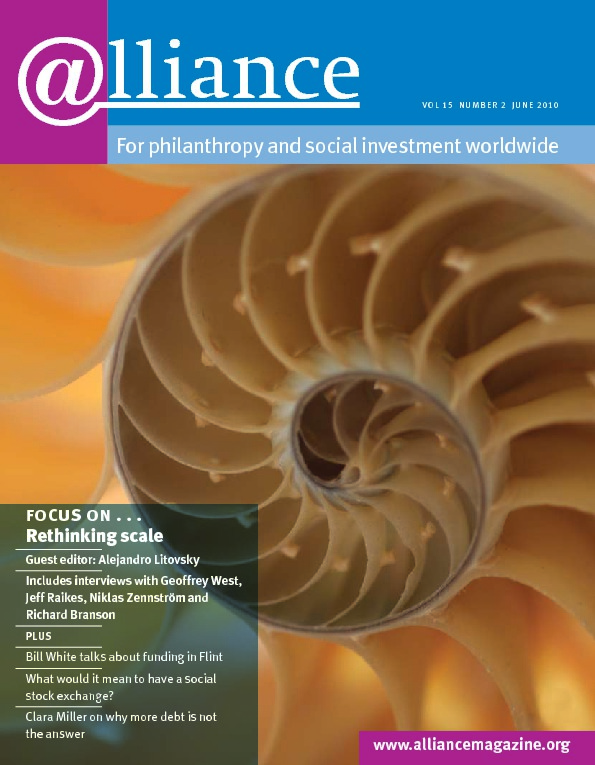How do you move from A to B to C, where C is orders of magnitude bigger than A? Social and environmental entrepreneurs, routinely challenged by their funders on how their concepts, technologies and business models will replicate at scale, often have no ready response. Yet if you had asked the same questions of Leonardo da Vinci, the Wright Brothers or Alexander Fleming, probing how their breakthroughs in areas like siege warfare, manned flight or antibiotics might achieve systemic change, I suspect many of them would have been just as nonplussed as some of the innovators and entrepreneurs we work with.
Such pioneers are often driven by a burning ambition to make things work a bit better, to try something new and see what happens, or to outflank competitors – rather than starting off with clearly formed ideas on how they will achieve scale.
When I first started working in the field of social change, some 40 years ago, I began by focusing on government – because that was where the interesting action seemed to be. After five fairly frustrating years, I became convinced that greater progress would be made by tapping into the innovativeness of markets.
To begin with, the focus was on corporate compliance with new regulations and public policies, but soon the environmental movement went ‘beyond compliance’, working with the likes of 3M, whose Pollution Prevention Pays (3P) Program saved or made over $1 billion in 25 years.
Now the torch has been taken up by the likes of General Electric, with its Ecomagination initiative (which aims to develop new generations of clean technology) headed towards revenues of $25 billion in 2010, and GSK, with its new access to medicines strategy, announced by their CEO Andrew Witty shortly after he took over the top post.
Just under a decade ago, however, I began to feel profoundly uneasy, around the time I first began to interact with the Schwab Foundation for Social Entrepreneurship and the World Economic Forum. What I saw mainstream companies doing – and helped them do – seemed unlikely to bridge the yawning divides in terms of the global availability of food, water, energy, healthcare and education.
We need to recognize that sustainability is not the same as corporate social responsibility (CSR) – nor can it be reduced to achieving an acceptable balance across economic, social and environmental bottom lines. Instead, it is about the fundamental, intergenerational task of winding down the dysfunctional economic and business models of the 19th and 20th centuries, and the evolution of new ones fit for a human population headed towards 9 billion people, living on a small planet which is already in ‘ecological overshoot’.
So, with support from the Skoll Foundation, first at SustainAbility and then at Volans, we explored ways of bridging the worlds of social enterprise and mainstream business, with three interlinked research programmes. The first focused on what several hundred social and environmental entrepreneurs were doing – and on what they wanted from mainstream business. The second investigated the world of social intrapreneurs, trying to drive similar agendas inside major companies like Banco Real, Coca-Cola or Morgan Stanley. And the third viewed the global downturn through the eyes of dead economists like Nikolai Kondratiev and Joseph Schumpeter – spotlighting potentially transformative changemakers in the private, public and citizen sectors.
We concluded that the world is entering a period of creative destruction, in which large clods of our economies will be carved away – and totally new industries created, often exploding into view from the margins of the current economic order.
So what does this mean for foundations? Well, if the New Economy era – which gave us new businesses like Amazon, eBay and Google – was anything to go by, then huge new wealth will be generated over the next decade, often in unexpected places. We must work out how to engage newly wealthy people, and the foundations that some of them will form, helping them focus both their philanthropy and their business acumen on the twin causes of sustainability and social innovation.
History suggests that foundations need to spread their bets, funding not only sure-fire winners but also high-risk, high-potential outliers. This is partly a question of the more strategic focusing of funding, but it may also involve the investment of capital in promising new ventures related to the foundation’s social mission.
Foundations must help mainstream business support social and environmental entrepreneurs – with mainstream social intrapreneurs a ready source of intelligence and advice. And, by no means finally, we all need to help governments to rewire markets, creating the policy frameworks and incentives that can catalyse the necessary pace and scale of change.
John Elkington is executive chairman of Volans and co-founder and non-executive director of SustainAbility. Email john@volans.com



Comments (0)